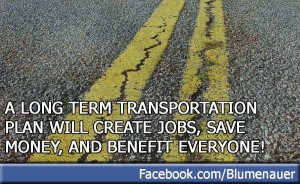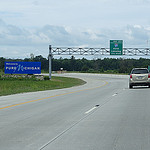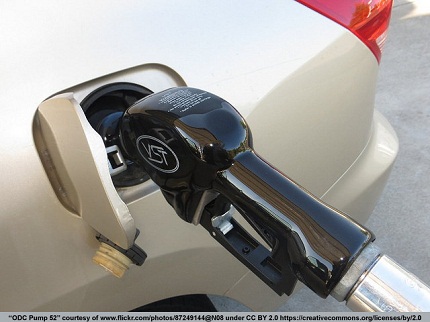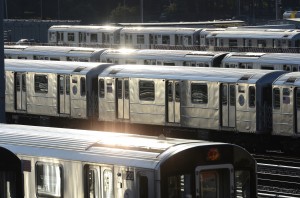ASCE Endorses an UPDATE to the Gas Tax
February 5th, 2015 | By: Becky Moylan
 Twenty-two years ago ‘I Will Always Love You’ was the top song on the Billboard charts, a loaf of bread cost $0.75, and Unforgiven won the Oscar for Best Picture. A lot has changed since then, yet the gas tax rate that funds our transportation system has remained the same. Yesterday, the American Society of Civil Engineers stood with Congressman Earl Blumenauer (D-OR) in support of a bill that would change that.
Rep. Blumenauer, along with more than 20 cosponsors, introduced the “Update, Promote, and Develop America’s Transportation Essentials” (UPDATE) Act. UPDATE offers a long-term, sustainable solution to fix the Highway Trust Fund by increasing the gas tax to recoup the purchasing power it has lost due to inflation since 1993. The bill proposes the gas tax to be raised 5 cents per year for the next three years, then tie it to inflation.
With one in nine bridges in the U.S. structurally deficient and congestion on 42 percent of America’s urban highways, our country is in need of an increased investment in our transportation system.
ASCE’s Executive Director Tom Smith joined representatives from the U.S. Chamber of Commerce, the American Trucking Associations, and other groups to support the bill. In his remarks, Smith said:
“The federal motor fuels tax, which funded the creation of America’s Interstate Highway System, hasn’t been increased in over 20 years and has lost more than one-third of its purchasing power. Essentially, we’re trying to pay for 2015 infrastructure with 1993 dollars.
“This bill will provide long-term, sustainable funding to meet identified needs and revitalize our nation’s transportation network for decades to come.”
Without Congressional action, the Highway Trust Fund’s authorization expires in May, and the funding will run out in the summer—during the height of road construction improvement season. Rep. Blumenauer’s bill would ensure the trust is restored in the Highway Trust Fund, by allowing states to effectively plan long-term projects knowing the federal government will be a continued partner in funding.
Twenty-two years ago ‘I Will Always Love You’ was the top song on the Billboard charts, a loaf of bread cost $0.75, and Unforgiven won the Oscar for Best Picture. A lot has changed since then, yet the gas tax rate that funds our transportation system has remained the same. Yesterday, the American Society of Civil Engineers stood with Congressman Earl Blumenauer (D-OR) in support of a bill that would change that.
Rep. Blumenauer, along with more than 20 cosponsors, introduced the “Update, Promote, and Develop America’s Transportation Essentials” (UPDATE) Act. UPDATE offers a long-term, sustainable solution to fix the Highway Trust Fund by increasing the gas tax to recoup the purchasing power it has lost due to inflation since 1993. The bill proposes the gas tax to be raised 5 cents per year for the next three years, then tie it to inflation.
With one in nine bridges in the U.S. structurally deficient and congestion on 42 percent of America’s urban highways, our country is in need of an increased investment in our transportation system.
ASCE’s Executive Director Tom Smith joined representatives from the U.S. Chamber of Commerce, the American Trucking Associations, and other groups to support the bill. In his remarks, Smith said:
“The federal motor fuels tax, which funded the creation of America’s Interstate Highway System, hasn’t been increased in over 20 years and has lost more than one-third of its purchasing power. Essentially, we’re trying to pay for 2015 infrastructure with 1993 dollars.
“This bill will provide long-term, sustainable funding to meet identified needs and revitalize our nation’s transportation network for decades to come.”
Without Congressional action, the Highway Trust Fund’s authorization expires in May, and the funding will run out in the summer—during the height of road construction improvement season. Rep. Blumenauer’s bill would ensure the trust is restored in the Highway Trust Fund, by allowing states to effectively plan long-term projects knowing the federal government will be a continued partner in funding.
Tags: gas tax, highway trust fund, surface transportation
No Comments »
New Year, New Congress, New Hope for Infrastructure Investment
January 9th, 2015 | By: Olivia Wolfertz
It’s a new year, and with a new Congress in session, there is hope that a federal funding solution for infrastructure can soon be reached. Congress has given us reasons to be optimistic, with more bipartisan support for infrastructure funding buzzing at the federal level. Upon reflecting on the past year’s infrastructure challenges, ranging from water main failures to increased highway congestion and a renewed focus on bridge disrepair, many lawmakers from both political parties are pressing for funding solutions which no longer rule out a possible gas tax increase. Senate Republican Environment and Public Works Chairman James Inhofe indicated more open mindedness toward raising the federal gas tax to solve our transportation infrastructure deficit. Inhofe said that “everything is on the table,” and that his top priority is passing a long-term transportation bill. Senator John Thune (R-S.D.) also agreed that Republicans should leave the door open for a gas tax increase, but defended it as a “user fee,” which ensures each driver pays his or her fair share. In addition to discussing a gas tax increase, legislators are carefully considering other options to fund infrastructure. Senator Bernie Sanders (I-Vt.) plans to introduce a bill in the new session of Congress to “authorize $1 trillion in spending over several years to rebuild the nation’s roads and bridges and invest in other infrastructure modernization projects.” Speaker of the House John Boehner noted that figuring out how to fund the highway bill is an important priority for this year. State governments are also starting the new year with plans to fund infrastructure. Virginia, Pennsylvania and North Carolina have all recently increased their state gas taxes to help fund state transportation projects. In Minnesota, Sen. Amy Klobuchar plans to work across party lines to help pass a long-term transportation bill that will fund projects in her state. While state-level funding efforts are worthwhile, in order to meet the necessary infrastructure investment needs, we need a long-term, sustainable federal funding solution. Hopefully Congress can compromise on a funding solution before the Highway Trust Fund goes insolvent again in May.Tags: bipartisainship, congress, gas tax, highway trust fund, infrastructure report card
1 Comment »
Michigan Legislature Defers to the Public on Gas Tax
December 22nd, 2014 | By: Maria Matthews

Photo Credit: Sean Marshall/Flickr
- Increases vehicle registration fees by eliminating the 10% discount made available to new car buyers during their first three years of ownership.
- Raises registration fees for commercial trucks, hybrid and electric vehicles.
- Designates a portion of the additional revenue for transit.
- Eliminate all sales or use taxes on gasoline and diesel fuel used in motor vehicles operated on public roads or highways beginning on October 1, 2015;
- Allow an increase in the sales tax rate from 6 percent to 7 percent;
- Activate other laws dedicating additional revenue for transportation purposes, including repair of roads, streets, and bridges;
- Require state funds for school aid to be used exclusively for financial assistance for public school districts, community colleges, and career and technical education and related scholarships; and
- Dedicate a portion of use tax revenue for school aid purposes.
Tags: gas tax, infrastructure, roads
2 Comments »
This Week in Infrastructure: All the Reasons to Fix the Trust Fund
December 12th, 2014 | By: Olivia Wolfertz
Reports on transportation investment and its overall benefits to the economy provide incentive for Congress to #FixTheTrustFund as state lawmakers make their own push for infrastructure investment. On Tuesday, the American Association of State Highway and Transportation Officials (AASHTO) and the American Public Transportation Association (APTA) released the 2015 Bottom Line Report, which thoroughly evaluated our nation’s transportation investment needs in relation to our overall economy. According to the report, an estimated $163 billion annually over a six-year period is needed to fix our aging surface transportation. Currently only $83 billion is invested in roads and bridges and only $17.2 billion is invested in public transit. These dramatic investment discrepancies underscore the need for immediate action. Not only does investing in our public transportation benefit those who use it, but such investment also supports our economy by creating jobs. The study from the Transportation Construction Coalition, “Approximately 62 percent of the jobs created from federal highway and mass transit investment are outside the construction industry—service industries such as business, education, health.” Likewise, “every $1 in federal highway and mass transit investment increases the nation’s GDP between $1.80–$2.00.” As ASCE has been saying for years, investing in federal highway and mass transit will reap benefits beyond improving our daily commutes. A recent article in online publication, Mobility Lab, indicated that aging infrastructure also impacts the real-estate market, as road and transit conditions affect where renters and homeowners choose to live. Due to Congress’ lack of progress in fixing the Highway Trust Fund, several states are addressing their infrastructure needs by considering gas tax increases. NPR cited a growing number of Republicans across the country who are realizing that raising the gas tax may be the key to funding infrastructure. In Michigan, Gov. Rick Snyder is calling on lawmakers to double Michigan’s gas tax over time to raise more than $1 billion. Gas tax increases are also on the table for states like Georgia, New Jersey, Utah, South Carolina and South Dakota. With gas prices are at their lowest level in four years, states are motivated to seize this opportunity to raise money while they can. Though action on the state level to increase infrastructure funds is encouraging, the best thing for our nation and our economy is to fix the Highway Trust Fund and increase the national gas tax to match inflation. To learn more about what’s happening in your state and our country, download our newly updated 2013 Infrastructure Report Card app for your Android/iOS Tablet. A smart phone version will be available soon.Tags: gas tax, highway trust fund, infrastructure investment, infrastructure report card
No Comments »
This Week in Infrastructure: Final Push in 2014 for Highway Trust Fund Fix
December 5th, 2014 | By: Olivia Wolfertz
Power failures, drivers frustrated with abysmal road conditions and increased media attention to our nation’s aging infrastructure have rattled Americans and driven more states to pursue raising their gas tax as a way of fixing the Highway Trust Fund. This past Tuesday, a massive power failure left large sections of Detroit in darkness. According to the 2013 Report Card, our energy infrastructure scored a D+, largely due to the fact that the nation’s transmission and distribution systems, including 400,000 miles of electricity lines, have long outlived their life spans and desperately need maintenance. Much of the energy infrastructure dates back to the World War II era and some of it was constructed in the 1880s. According to the Yuma Sun paper, Detroit is in the midst of a $200 million upgrade to the power grid to help modernize it. If it takes $200 million to properly upgrade the power grid to one city, it is going to be a “tremendous undertaking to modernize the nation’s power grid.” ASCE would like to see partnerships at the state, local and federal levels to make these repairs happen. At the federal level some bipartisan cooperation around the gas tax has increased despite Congress being in the lame-duck session. As reported in The Hill, Rep. Tom Petri (R-Wis.) and Rep. Earl Blumenauer (D-Ore.) joined together, standing alongside a life-sized cutout of President Reagan, to reiterate support for the 1982 gas tax and to inspire lawmakers to raise the gas tax before the next Congress. ASCE supports this bipartisan proposal to raise the federal gas tax indexed with inflation and hopes it will continue to gain momentum. Meanwhile, an increase to the gas tax continues to be a topic of conversation. The White House Business Roundtable referenced Andy Herrmann’s interview on 60 Minutes in the context of needing a sustainable funding solution to our nation’s infrastructure as soon as possible. Even President Obama weighed in this week on the state of the nation’s infrastructure when he said, “It makes no sense that we have a first class economy with a second class infrastructure.” In comparison with countries like China, our infrastructure puts us to shame. Congress is running out of time this year to pass meaningful legislation to #FixtheTrustFund. Let’s hope they decide not to once again kick the can down the road and into 2015.Tags: 2013 Report, gas tax, highway trust fund
No Comments »
Higher Gas Taxes Will Help Michigan Build a 21st Century Infrastructure
December 4th, 2014 | By: Maria Matthews
In 1997, Dolly was cloned, we were excited by the release of IE 4, and ASCE hadn’t yet released its first Report Card for America’s Infrastructure. It is also the last time Michigan increased its gas tax to the current 19-cents per gallon. The diesel tax rate has been in effect since 1984. The time is now for the state legislature to take action. HB 5477 was approved by the Michigan Senate on November 13th. It’s now the Michigan House’s turn to send this measure to the Governor’s desk. This bill will gradually increase the fuel tax to 15.5% through 2018. Governor Rick Snyder (R) has been actively urging the legislature to send him an infrastructure funding bill. The 2009 Michigan Report Card gave the state’s roads and bridges a “D” grade. While this might be within range of the national average, roads in poor conditions cost the average Michigander about $538.96 in extra vehicle repairs and general operating costs. This is an almost 10% increase since the 2009 assessment. If enacted, drivers will see a gradual increase in the state gas tax over the next four years, which results in additional road and transportation project funding. Michigan needs the additional tax revenue to maintain and improve its roads. Signing this transportation bill into law would also:- The initial 3.5% increase to 9.5% per gallon could result in an immediate $205 million in additional revenue. When the tax is in full effect in January 2019 an estimated $1.25 billion in revenue will be generated.
- The tax will be calculated based on a flat rate of $2.81 over the next several years rather than being fixed to the consumer price index. This will help ensure a more steady increase in revenue, at 2% per year for 3 years, through 2019.
- Anticipated revenue will be allocated to the Michigan Transportation Fund (MTF) and should only be available to for use on transportation related projects.
Tags: gas tax, roads, transportation
No Comments »
Rock the Vote for Infrastructure on Nov. 4
October 31st, 2014 | By: Maria Matthews
 Have you ever taken the bus to work? Driven across a bridge? Turned on the faucet for a drink of water? You may have even noticed that some of these roads and bridges are in need of some TLC. Perhaps, you’ve heard news stories about how water becomes scarce at the time of drought, or the opposite, that dams might breech due to epic rains.
If any of this sounds familiar to you, Tuesday’s election is your chance to tackle your local infrastructure challenges head on!
Statewide ballot measures affecting everything from roads and bridges to water infrastructure needs will be put in your hands in at least eight states and many more localities. Here’s a rundown of what you could see in your neck of the woods:
Have you ever taken the bus to work? Driven across a bridge? Turned on the faucet for a drink of water? You may have even noticed that some of these roads and bridges are in need of some TLC. Perhaps, you’ve heard news stories about how water becomes scarce at the time of drought, or the opposite, that dams might breech due to epic rains.
If any of this sounds familiar to you, Tuesday’s election is your chance to tackle your local infrastructure challenges head on!
Statewide ballot measures affecting everything from roads and bridges to water infrastructure needs will be put in your hands in at least eight states and many more localities. Here’s a rundown of what you could see in your neck of the woods:
- California’s Proposition 1 asks voters to authorize the sale of bonds to invest statewide water supply infrastructure improvements. In a time of severe drought California needs you to vote “yes” to improve water storage, water quality, and reclamation.
- Hawaii voters will be asked to authorize “special purpose revenue bonds” to provide public and private dam and reservoir owners with financial assistance to maintain and improve structures. Voting “yes” on Question 4 will make this possible.
- Louisiana needs a “yes” vote on Amendment 4 to authorize the allocation of state funds to an infrastructure bank for eligible transportation projects and prompt the state legislature to take necessary steps toward the Bank’s creation. This is your chance to improve current road conditions and make your daily commute safer!
- Massachusetts needs a “no” vote on Question 1 to maintain the gas tax indexing component of the gas tax increase enacted in 2013. Allow the gas tax to remain linked to the Consumer Price Index and ensure a projected $1 billion of dedicated transportation revenue will be made available over the next decade to modernize roads and bridges.
- Maryland’s Question 1 needs your “yes” vote to ensure that revenue allocated to the Transportation Trust Fund will be used exclusively for the construction and maintenance of highways as well as related transportation purposes.
- Rhode Island’s Question 6 will allow the State to issue bonds and notes to fund enhancements and renovations to mass transit hub infrastructure. Vote “yes” will not only improve access to key transportation sites, healthcare, and other locations but, also stimulate the local economy by creating new jobs.
- Texas needs a “yes” vote on Proposition 1 to have funds from the state’s “rainy day” coffers and a portion of the state’s oil and gas tax revenues allocated to a dedicated fund for transportation projects. This measure creates a dedicated fund for the construction, maintenance, and rehabilitation of Texas’ roadways, and calls for the creation of a commission to identify Texas Department of Transportation savings.
- Wisconsin voters, like Maryland, are faced with a Question 1 that will prevent revenue allocated to the Transportation Trust Fund from being transferred into the state’s general fund. Vote “yes” to ensure transportation revenue earned by the state is used as intended!
- Voters in Humboldt County, California, and a few of its independent cities, will be asked to establish or raise sales taxes for various public works projects.
- In Colorado residents in the Pikes Peak region will be asked to invest in stormwater infrastructure by voting to create and fund the El Paso Regional Drainage Authority.
- The City of Wilmington, North Carolina ballot will ask citizens to approve a 2-cent property tax increase (about $40 per year for a $200,000 home) to improve the utility and safety of roads and sidewalks. Improvements include realigning intersections, adding traffic signals, and crosswalks.
- In Greenville County, South Carolina, ballots will include a 1% “sales and use” tax increase to fund road and bridge improvements as well as crosswalks and pedestrian trails.</span.
Tags: 2014BallotInitiatives, gas tax, infrastructure, water infrastructure
No Comments »
Say “No” to Aging Infrastructure Massachusetts: Vote “No” on Question 1!
October 9th, 2014 | By: Maria Matthews
 A statewide ballot question that would eliminate gas tax indexing will appear on the November ballot. The passage of Question 1 would be a step backward for the state, causing roads and bridges to fall into further disrepair.
The Boston Society of Civil Engineers Section has endorsed the Committee for Safer Roads and Bridges campaign and ASCE joins them in urging a “NO” vote on Question 1 on November 4th.
If the “Yes” votes pass the ballot measure, it would eliminate the requirement that the state’s gasoline tax:
(1) be adjusted every year by the percentage change in the Consumer Price Index over the preceding year, but
(2) not be adjusted below 21.5 cents per gallon.
If the “No” votes defeat the measure, Massachusetts will see no change to the gas increases established by the Transportation Finance Act of 2013 and retain the ability to more adequately meet its infrastructure needs.
Our aging infrastructure can’t wait. Experts say that far too many of Massachusetts bridges are structurally deficient, with many more becoming functionally obsolete. Not only is public safety put at risk when critical transportation funds are cut, but it also impedes economic growth. A safe and reliable transportation system that enables us to move goods and services and commute to work is the backbone of our economy. Repealing the indexing feature of the state’s gas tax would be a step backward.
Allowing the gas tax to remain linked to the consumer price index will:
A statewide ballot question that would eliminate gas tax indexing will appear on the November ballot. The passage of Question 1 would be a step backward for the state, causing roads and bridges to fall into further disrepair.
The Boston Society of Civil Engineers Section has endorsed the Committee for Safer Roads and Bridges campaign and ASCE joins them in urging a “NO” vote on Question 1 on November 4th.
If the “Yes” votes pass the ballot measure, it would eliminate the requirement that the state’s gasoline tax:
(1) be adjusted every year by the percentage change in the Consumer Price Index over the preceding year, but
(2) not be adjusted below 21.5 cents per gallon.
If the “No” votes defeat the measure, Massachusetts will see no change to the gas increases established by the Transportation Finance Act of 2013 and retain the ability to more adequately meet its infrastructure needs.
Our aging infrastructure can’t wait. Experts say that far too many of Massachusetts bridges are structurally deficient, with many more becoming functionally obsolete. Not only is public safety put at risk when critical transportation funds are cut, but it also impedes economic growth. A safe and reliable transportation system that enables us to move goods and services and commute to work is the backbone of our economy. Repealing the indexing feature of the state’s gas tax would be a step backward.
Allowing the gas tax to remain linked to the consumer price index will:
- Ensure the gas tax keeps up with need. We went 22 years without an increase in our gas tax causing us to fall behind other states and our roads and bridges to deteriorate.
- Enable Massachusetts to invest wisely in the creation and maintenance of infrastructure.
- Provide a more stable revenue stream so Massachusetts will not have to burden commuters and other motorists with tolls.
- Keep Massachusetts competitive in the national and global economy.
- Create jobs by maintaining a steady revenue stream that can fund investments in transportation.
Tags: 2014BallotInitiatives, gas tax, infrastructure
No Comments »
21-Year-Old Gas Tax Rate Still Holding Up America’s Roads & Bridges
October 1st, 2014 | By: Becky Moylan
The following is a statement from Randall (Randy) S. Over, P.E., F.ASCE, president of the American Society of Civil Engineers (ASCE), regarding the 21st anniversary of the last federal gas tax increase: “Today the federal gas tax’s 18.4-cent rate turns 21. While this is a rite of passage for American college students, this milestone is a sad reflection on Congressional inaction when it comes to our transportation system. According to the Consumer Price Index many household prices have nearly doubled in the past 21 years.- A loaf of bread cost: 1993: $0.75, 2014: $1.39.
- A pound of coffee: 1993: $2.50, 2014: $5.16.
Tags: bridges, gas tax, highway trust fund, roads, transit
No Comments »
Summer Travel Boom as Americans Hit the Road
September 5th, 2014 | By: America's Infrastructure Report Card
After being cooped up inside for what was in some parts of the country the coldest and snowiest winter on record, it appears based upon latest data from the Federal Highway Administration (FHWA) that Americans traveled on our roadways in force this spring and early summer. Vehicle miles traveled (VMT), a common measure of roadway use, hit its highest level in six years between July 2013 and June 2014. The first half of 2014 saw the fourth-highest mileage number ever since the FHWA first began collecting VMT information nearly eight decades ago. While dipping VMT has had its benefits for transit ridership and environmental air quality, the uptick is particularly good news for the ailing federal Highway Trust Fund (HTF), which provides state and local governments with money for transportation. A decrease in VMT during the end of 2007 following the Great Recession came at a time when highway and transit spending was exceeding revenues in the HTF. Since 2010, as the economy has improved, VMT has been slowly inching upward. However, this latest FHWA data suggests that VMT and the gasoline taxes that are collected remains a viable way to generate user fees for the HTF to dedicate towards transportation improvements. The real problem appears to be the annual decrease in purchasing power of user fees as a result of Congress’ inability to raise rates in order to maintain necessary federal investments in infrastructure. Congress should be encouraged by this latest report on the health of American mobility and use it as an opportunity to #FixTheTrustFund.Tags: gas tax, highway trust fund, transportation, VMT
No Comments »



 */ ?>
*/ ?>















